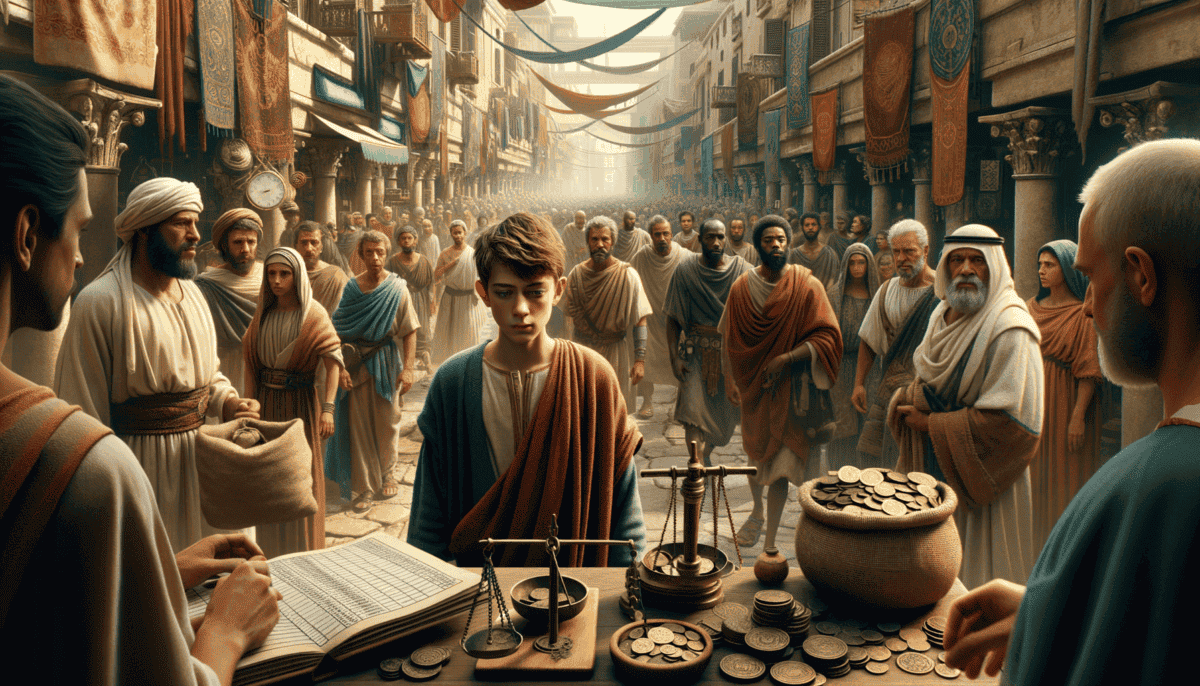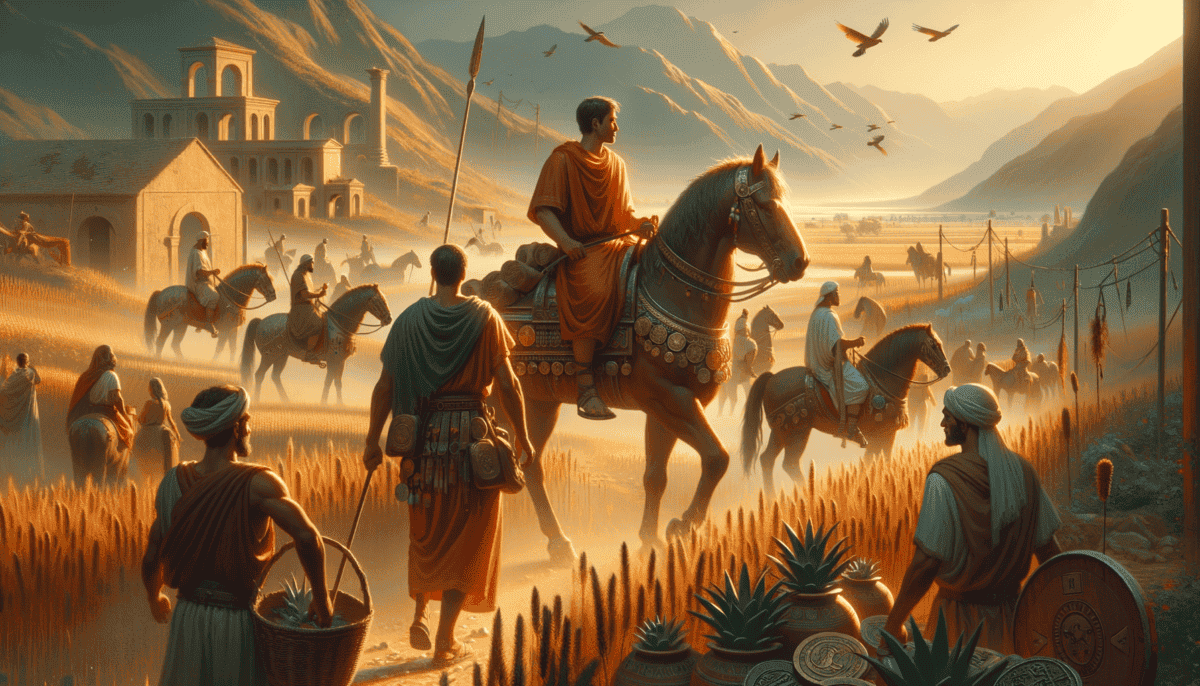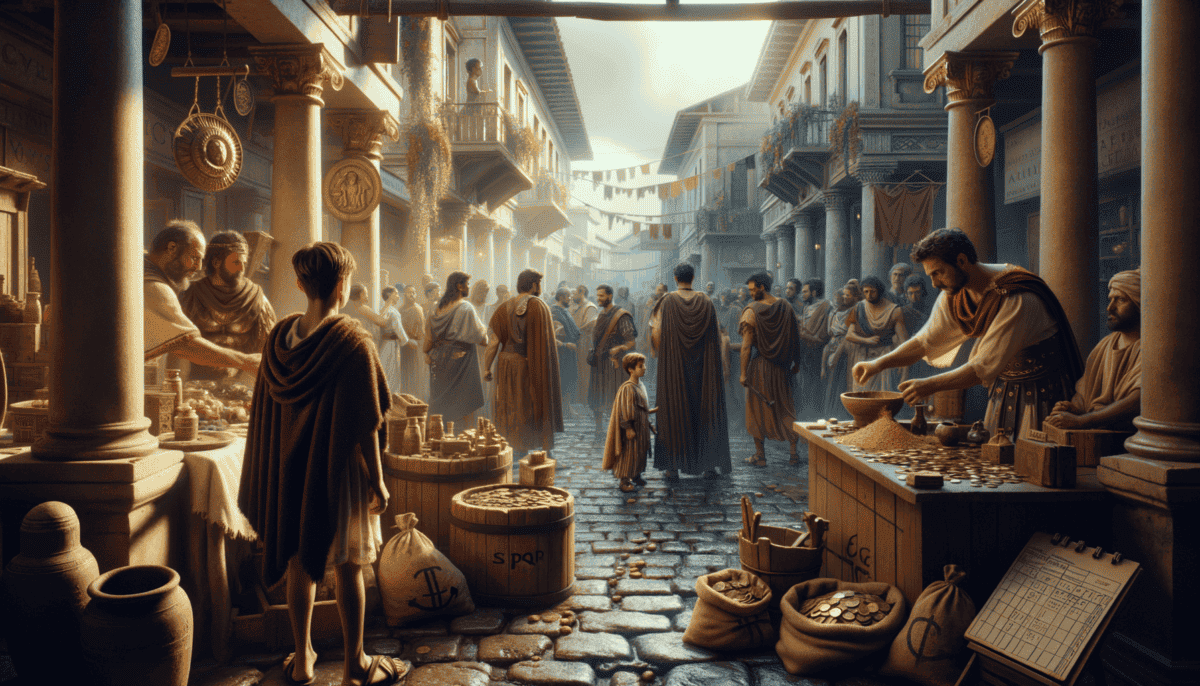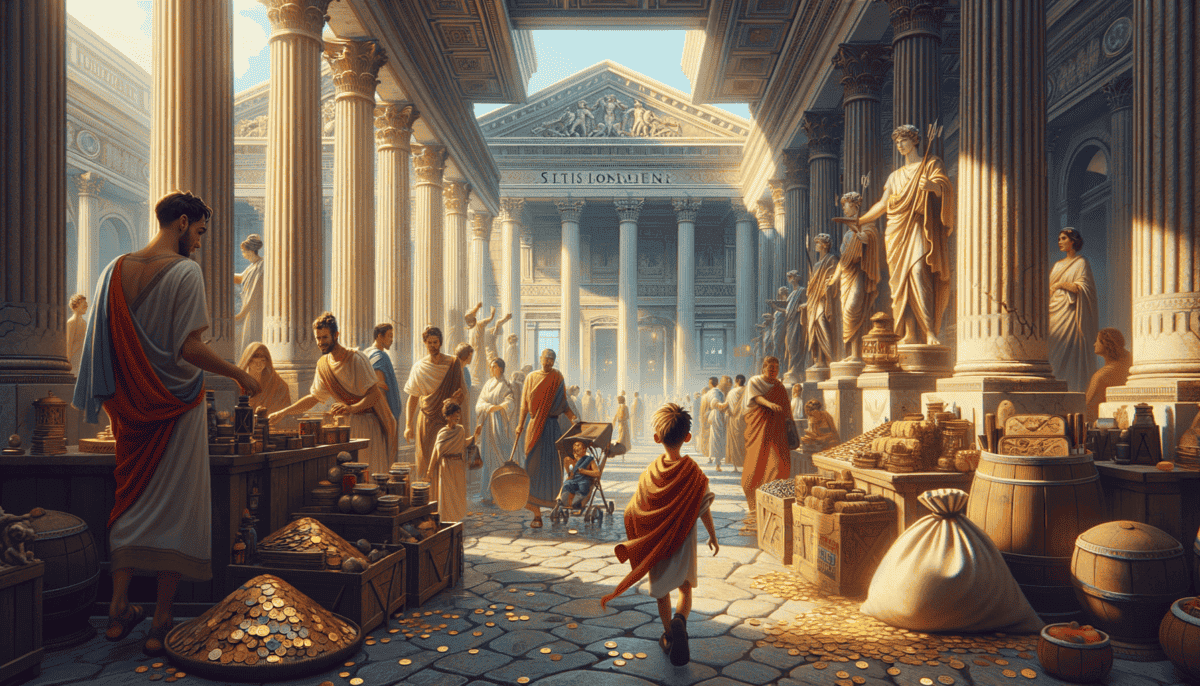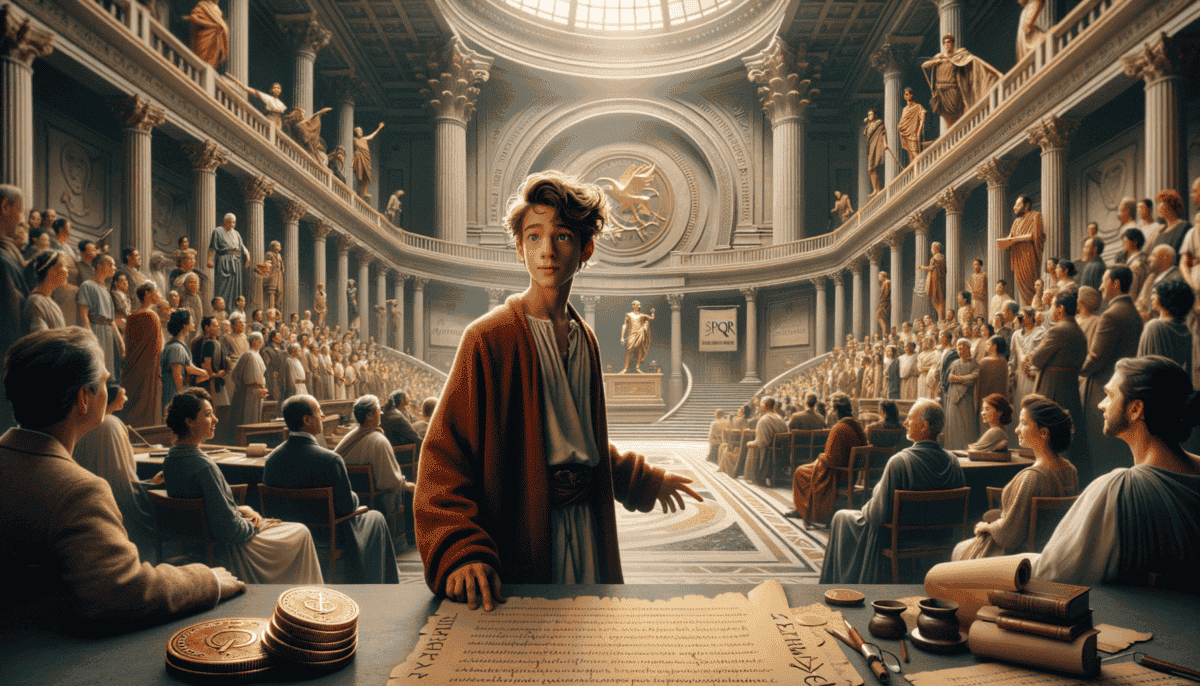The Tax Collector’s Son
Marcus kicked a small pebble down the dusty Roman street, watching it bounce off the worn cobblestones. The morning sun was already hot, making his sandals sticky against his feet. He could hear the whispers as he walked past the market stalls – the same whispers he always heard.
"That's Lucius's boy," one merchant muttered to another. "The tax collector's son."
Marcus pulled his toga closer, even though he was warm. He didn't like how people looked at him differently once they knew who his father was. At twelve years old, he was old enough to notice these things.
️ The grand buildings of Rome stretched high above him, their marble columns gleaming white against the blue sky. This was his home, but sometimes it felt like he didn't quite belong.
His father's voice echoed in his mind from their conversation that morning:
"Marcus, it's time you learned about the family business. Tax collection is a noble profession – we keep Rome running!"
But if it was so noble, why did people look scared when his father approached? Why did they hurry to hide their goods or close their shop doors?
Marcus stopped at his favorite spot – a small fountain where he could watch people going about their day. A woman was filling her water jug while her little boy played nearby. When she noticed Marcus, she quickly gathered her son and hurried away.
"I'm just a normal kid," Marcus whispered to himself. "I like to play games and swim in the river just like everyone else."
His best friend Claudius came running up, out of breath and excited. "Marcus! Come quick! There's a new shipment at the docks – they're unloading exotic animals for the arena!"
For a moment, Marcus forgot about his troubles. "Really? Lions?" His eyes lit up with excitement.
"And tigers too! Race you there!" Claudius took off running.
As they raced through the streets, dodging carts and weaving between market stalls, Marcus felt free. Here, running with his friend, he wasn't the tax collector's son – he was just Marcus.
The salty breeze from the harbor ruffled their hair as they reached the docks. Crowds had gathered to watch the unloading of massive cages.
"One day," Marcus said thoughtfully, watching the tax collectors counting and recording the value of the imported animals, "I want to understand why we need taxes. There must be a good reason, right?"
Claudius shrugged. "My father says taxes build the roads and pay the soldiers."
"But why do people hate the tax collectors so much?"
Before Claudius could answer, a deep voice called out. "Marcus! There you are!"
Marcus turned to see his father striding toward them, scroll in hand, his official badge gleaming on his chest. People stepped aside to let him pass, their faces careful and neutral.
"It's time for your first lesson," his father said, placing a hand on Marcus's shoulder. "You're old enough now to learn about our family's role in keeping the Empire strong."
Marcus looked back at Claudius, who gave him an encouraging smile. Maybe understanding taxes would help him understand why people acted the way they did. Maybe he could even find a way to make things better.
As he walked away with his father, Marcus stood a little straighter. He had many questions, but one thing was certain – he was going to learn everything he could about this mysterious world of Roman taxes.
The afternoon sun cast long shadows across the forum as father and son walked together, ready to begin a journey that would change not just Marcus's life, but perhaps the way tax collection worked in Rome itself.
Claudius called after him: "See you tomorrow at the games, Marcus!"
Marcus waved back, a small smile playing on his lips. Tomorrow would be fun, but today… today he would start to understand the family business that everyone seemed to fear.
A Day of Shadows
The early morning light filtered through the columns as Marcus followed his father through the bustling streets of Rome. Today was his first real day learning about taxes. His stomach felt like it was full of butterflies.
“Watch carefully, son,” his father said, adjusting his official badge. “Every coin we collect helps build Rome.”
Their first stop was a small bakery. The sweet smell of fresh bread made Marcus’s mouth water. But the baker’s smile disappeared when he saw them coming.
“Good morning, Flavius,” Father said warmly. “Time for your monthly count.”
Marcus watched as the baker’s hands shook while counting out copper coins. He remembered buying honey cakes here last week – the baker had been so friendly then.
“Father,” Marcus whispered, “why is he so scared?”
“It’s not fear, son. It’s respect for the law.”
But Marcus wasn’t sure. He saw how the baker’s eyes darted around, how his shoulders hunched.
They visited more shops through the morning – a pottery maker, a cloth merchant, and a wine seller. Each time, the same scene played out. Smiles fading, hands trembling, coins being counted.
At the marketplace, they met Rufus, another tax collector. His face was hard, and his voice was loud.
“Pay up!” Rufus shouted at a fruit seller. “No excuses!”
Marcus saw tears in the old woman’s eyes as she handed over her coins. His chest felt tight.
“Father,” he said, “couldn’t Rufus be… nicer?”
His father paused, looking thoughtful. “There are different ways to do this job, Marcus. Remember that.”
The afternoon sun beat down as they climbed the hill to the grain storage. Here, Marcus saw something new. His father sat down with the grain master, looking at records together.
“See here,” Father explained, pointing to numbers on a scroll. “We need to know how much grain comes in so we can plan for winter. Taxes help us keep track.”
| Tax Type | What It Helps Build |
| Grain Tax | Feeds the poor and army |
| Trade Tax | Roads and bridges |
| Property Tax | Public buildings |
By sunset, Marcus had learned more than just numbers. He’d seen how his father could be firm but fair. He’d watched people’s faces and understood their worries.
Walking home, they passed the new aqueduct being built. Workers were carefully placing stones, supervised by an engineer.
“That’s what taxes build,” his father said proudly. “Clean water for everyone.”
Marcus nodded slowly. “But father, couldn’t we find a way to collect taxes that doesn’t make people so afraid?”
His father stopped walking and looked at him with surprise. Then he smiled.
“You know, Marcus, that’s exactly the kind of thinking Rome needs. Maybe you’ll be the one to figure it out.”
That night, lying in bed, Marcus thought about everything he’d seen. The scared baker, the crying fruit seller, but also the mighty aqueduct and the careful grain records. There had to be a better way.
Tomorrow, they would visit the provinces outside Rome. Marcus wondered what new things he would learn there. As he drifted off to sleep, numbers and faces swirled in his dreams, and somewhere in the mix, a small idea began to form.
Journey to the Provinces
The sun was barely peeking over the horizon when Marcus and his father climbed into their carriage. They were heading to Gaul, a province far from Rome.
“Why are we going so far, Father?” Marcus asked, watching the city walls fade behind them.
“Every part of Rome needs taxes, son. Even the farthest provinces.”
As they traveled, Marcus saw things changing. The houses looked different. People wore strange clothes. Even the languages sounded new to his ears.
“Look, Marcus!” His father pointed to a group of farmers working in fields. “They grow wheat for all of Rome.”
When they reached the main town in Gaul, Marcus was surprised. It wasn’t like Rome at all. The buildings were made of wood instead of marble. The streets were muddy, not paved.
A local official named Brutus met them at the town center. His face was worried.
“The harvest was poor this year,” Brutus said softly. “The people are struggling.”
Marcus watched his father’s face carefully.
| Province Problems | Ways to Help |
| Poor harvest | Extra time to pay |
| Bad roads | Use tax money for repairs |
| Sick animals | Send medicine from Rome |
“Show me the records,” Father said kindly.
They spent the morning looking at scrolls. Marcus noticed something strange. The local tax collectors, called publicani, seemed to ask for more than what was written down.
“Father,” Marcus whispered, “why do they take extra?”
His father frowned. “Some collectors think only of themselves, not Rome or its people.”
Later, they visited a farmer’s family. Their home was small, with a leaky roof. Yet they offered Marcus and his father bread and cheese.
“We try to pay our taxes,” the farmer’s wife said, “but the publicani keep raising them.”
Marcus felt his heart sink. He remembered the baker in Rome, but this felt worse.
️ That evening, in their room at the inn, Marcus couldn’t stop thinking about what he’d seen.
“Father, it’s not fair! The publicani are hurting these people.”
His father sat down beside him. “You’re right, Marcus. But remember – taxes themselves aren’t bad. They build roads, bring water, and protect people. It’s how we collect them that matters.”
“Can’t we help?” Marcus asked.
“That’s why we’re here. To make sure things are done right.”
The next day, they met with all the local tax collectors. Marcus watched his father carefully explain the proper amounts to collect. Some publicani looked angry, but most listened.
“Rome prospers when its people prosper,” Father told them. “Remember that when you collect your taxes.”
As they prepared for their journey home, Marcus saw the farmer’s wife again. She was smiling now, talking to his father about the new tax rules.
On the road back to Rome, Marcus thought about all he had learned. The provinces were different from Rome, but the people were the same. They all wanted to be treated fairly.
“Father,” he said suddenly, “when I grow up, I want to help make things better. Not just collect taxes, but help people understand why they matter.”
His father smiled proudly. But before he could answer, they heard shouts from a nearby village. Something was wrong, and Marcus could feel new challenges waiting ahead.
Winds of Change
The shouts grew louder as Marcus and his father approached the village. Angry people filled the streets, waving their fists in the air.
“No more taxes! No more hunger!” they yelled.
Marcus’s father pulled their carriage to a stop. “Stay close to me, son.”
A woman with tired eyes stepped forward. “Our children are hungry because the tax collectors take too much!”
Marcus watched as more villagers joined her. Some held empty grain baskets. Others showed torn clothes.
“Please,” Marcus’s father said calmly, “let’s talk about this. I’m Lucius, from Rome.”
The crowd grew quiet. An old man with a walking stick spoke up.
“The publicani took our winter stores. They said Rome needed more this year.”
| Village Needs | Tax Collector Actions |
| Food for winter | Took extra grain |
| Money for seeds | Demanded more coins |
| Tools for farming | Seized property |
Marcus felt his stomach twist. He remembered the farmer’s wife they had just helped. These people needed help too.
“Father,” Marcus whispered, “can’t we do something?”
His father nodded. “Where is your tax collector?” he asked the crowd.
“In the big house,” someone shouted. “Getting rich while we starve!”
“A tax collector should help Rome grow, not crush its people,” Marcus’s father declared.
Inside the big house, they found Cassius, the local tax collector. He sat at a fancy table covered with coins.
“These peasants don’t understand,” Cassius sneered. “Rome needs its gold.”
Marcus stepped forward bravely. “But Rome needs its people more!”
His father smiled proudly at Marcus’s words.
“My son is right,” Father said. “You’ve broken Rome’s laws by taking too much. This stops today.”
They spent hours fixing things. Father made Cassius:
• Return the extra grain
• Give back seized property
• Write fair tax amounts
Outside, the crowd waited. When Marcus and his father told them the news, cheers filled the air.
“See, Marcus?” his father said. “This is why we travel to the provinces. Not just to collect taxes, but to protect people.”
The old man with the walking stick approached them. “Thank you for listening to us. Most Romans just take and leave.”
Marcus looked at all the happy faces. He understood something important: being a good tax collector meant caring about people, not just money.
That night, as they camped under the stars, Marcus wrote in his diary: “Today I learned that the greatest power isn’t in taking, but in helping. Rome is strong when its people are strong.”
A wolf howled in the distance. Marcus knew tomorrow would bring new villages, new problems, and new chances to make things right. But now he was ready.
Hidden Powers
Marcus stood in awe at the entrance of the Roman Senate. ️ Tall marble columns reached toward the sky. Important men in white togas hurried past.
“Welcome to where Rome’s biggest decisions are made,” Father said, placing a hand on Marcus’s shoulder.
“But why are we here, Father?” Marcus asked, still thinking about the village they had helped yesterday.
“Today you’ll learn why taxes matter to Rome,” Father smiled. Inside, the Senate chamber buzzed with voices.
Senator Flavius, an old friend of Father’s, greeted them. “Ah, young Marcus! Ready to see how your work helps build Rome?”
They followed Flavius to a large map on the wall. ️ It showed all of Rome’s lands.
| Tax Money Builds | Benefits for People |
| Roads | Easy travel and trade |
| Aqueducts | Clean water for all |
| Schools | Learning for children |
“Look here,” Flavius pointed. “The taxes you collect help build roads that connect our empire. They pay soldiers who keep us safe. They bring water to dry places.”
Marcus’s eyes widened. “So the coins we collect… they help everyone?”
“Yes, but—” Flavius lowered his voice. “Some senators want to raise taxes again. They forget about the hungry people.”
Marcus remembered the angry villagers. “That’s not right!”
“Exactly why we need good people like you and your father,” Flavius winked.
Suddenly, shouting erupted in the Senate chamber. Two senators argued about tax rates.
“The provinces must pay more!”
“They already give too much!”
Marcus watched as his father stepped forward. “Senators, listen! I’ve seen our provinces. They need help, not higher taxes.”
He told them about the village protest. About hungry children and empty grain baskets.
The room grew quiet. One by one, senators nodded. Marcus felt proud of his father’s brave words.
Later, walking through the Forum, Marcus stopped at a new road being built.
“Father, I understand now. Tax collecting isn’t just about taking money. It’s about building things that help people.”
“And what do you think about becoming a tax collector now?” Father asked.
Marcus watched workers lay stones for the road. He thought about the village they helped, and the Senate’s power to make things better or worse.
The most important things a tax collector needs:
• A kind heart
• Smart mind
• Brave spirit
• Fair judgment
As the sun set behind the Senate building, Marcus knew he had an important choice to make. Would he follow his father’s path? Could he help make the tax system better?
A cool evening breeze carried the smell of fresh bread from a nearby bakery. Tomorrow would bring new discoveries, but tonight Marcus had much to think about.
A Fair Future
The morning sun sparkled on the marble steps of Marcus’s home. He sat in the garden, drawing plans on a wax tablet.
“What if we could make taxes better for everyone?” Marcus whispered to himself, sketching ideas.
Father appeared, carrying fresh figs for breakfast. “You’re up early, son.”
“I couldn’t sleep, Father. I’ve been thinking about everything we’ve seen.” Marcus showed his tablet. “Look at my ideas!”
Father sat beside Marcus, eyes twinkling. “Tell me more.”
“Remember the village we helped? What if we had special rules for when crops fail? And look—” Marcus pointed excitedly to his drawings. “We could build grain stores to help people in hard times!”
"These are brave ideas," Father smiled. "But changing old ways isn't easy."
“Then we’ll work harder!” Marcus jumped up. “Can we show these to Senator Flavius?”
| Old Way | Marcus’s New Way |
| Same tax for all | Fair tax based on wealth |
| Strict payment times | Flexible payment plans |
| Harsh penalties | Help for struggling families |
That afternoon, they visited Senator Flavius’s villa. The old senator listened carefully to Marcus’s ideas. ️
“By Jupiter!” Flavius exclaimed. “You’ve thought this through like a true Roman leader!”
“Will you help us make these changes?” Marcus asked hopefully.
“It won’t be quick or easy,” Flavius warned. “But Rome wasn’t built in a day. We’ll start small, in your father’s collection area.”
Marcus beamed with pride. His journey from confused tax collector’s son to someone who could help make real changes felt amazing!
“I know what I want to be now,” Marcus announced. “Not just a tax collector, but someone who makes the system fair for everyone.”
As spring turned to summer, Marcus and his father worked together. They helped farmers plan their payments. They listened to merchants’ problems. They made sure rich citizens paid their share.
One sunny morning, they visited the village that had first opened Marcus’s eyes. Children played in the streets now. Market stalls overflowed with food.
“Welcome!” the village elder called out. “Our tax collectors have become our friends!”
Marcus smiled at his father. Their work was just beginning, but change was possible. One coin, one scroll, one kind act at a time.
At sunset, standing on their favorite hill overlooking Rome, Father asked, “Ready for tomorrow’s collections, Marcus?”
"Ready, Father," Marcus nodded. "We have much good work to do."
As stars appeared above the eternal city, Marcus knew his greatest adventure wasn’t ending—it was just beginning.


